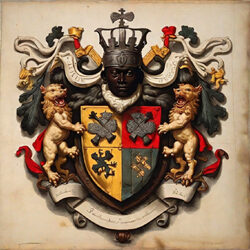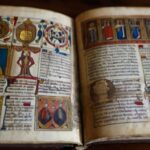In a world where historical narratives often omit or downplay the contributions of marginalized communities, it becomes imperative to reclaim and restore the true cultural heritage of foundational Black Britons. These are the faces that some would rather keep hidden, the ancestors whose legacy is woven into the very fabric of Britain’s history.

Tonight, we embark on a journey of discovery, shedding light on the rich and often overlooked history of Black Britons, who are sovereign to this land. Our discussion delves into the language, evidence gathering, and cultural continuities that connect us to our African antecedents and define our unique identity as foundational Black Britons.
Language, as we know, holds immense power in shaping perceptions and understanding. While some may question the use of the term “Black,” a deeper exploration reveals its ancient origins rooted in languages far older than Greek. In the Baba languages, “more” means land, predating the Greek usage. Proto-Sanskrit traces back over 10,000 years, where “bleg” meant to shine or burn, evolving into “black” in modern English. Understanding these linguistic roots is key to reclaiming our narrative and heritage.
The evidence of our presence and influence in Britain’s history is undeniable. Archaeological finds, such as the Mauryan stone derivative of the Moors discovered in Ireland, speak volumes about the interconnectedness of cultures across ancient lands. The very name “Mumu,” originally “Mumu,” meaning Lord of the Land, underscores our indigenous connection to these territories.
Digging deeper into historical texts reveals even more profound connections. References to “Mori” in Hittite texts and the identification of “Morian” populations in Babylonia illuminate a shared history that transcends geographical boundaries. These historical truths challenge the false narratives that have distorted our reality for centuries.
Culture, as aptly put, is to humans what water is to fish—a total environment that shapes our identities and behaviors. Yet, many of us have been recipients of false historical narratives that obscure our rightful place in history. It is time to put the faces of foundational Black Britons back into our collective consciousness, reclaiming our cultural heritage and rightful place in shaping the narrative of Britain’s history.
As we navigate through discussions of language, evidence gathering, and historical connections, let us not discard valuable insights by dismissing words or concepts without understanding their deeper meanings. Let us embrace our lineage, reclaim our narrative, and honor the resilience and contributions of foundational Black Britons who have shaped and enriched this land for generations.
In conclusion, the journey to reconnect with our roots and reclaim our heritage is ongoing. By acknowledging and celebrating the foundational Black Britons who laid the groundwork for our cultural tapestry, we honor their legacy and pave the way for a more inclusive and accurate understanding of history. The faces that were once hidden are now emerging from the shadows, reminding us of the vibrant and diverse history that defines us as a nation.




